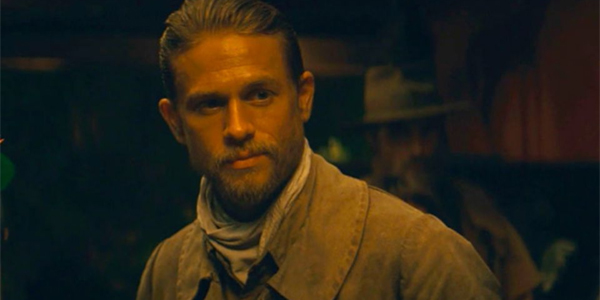How Charlie Hunnam Thinks The Lost City Of Z Should Have Really Ended

Your Daily Blend of Entertainment News
You are now subscribed
Your newsletter sign-up was successful
SPOILER WARNING: The following article contains spoilers for the end of The Lost City of Z. The movie is based on a true story, so history is really a spoiler in this particular case, but if you wish not to know any details about the end of the film, please save this page until after your screening.
In the final scenes of The Lost City Of Z, the mysterious fate of explorer Percy Fawcett (Charlie Hunnam) and his son (Tom Holland) is painted with a slightly ambiguous, but still rather scary brush. Lining up with theories from historians, the film depicts the duo running afoul of a cannibalistic tribe and being literally marched into darkness. This was the angle chosen by writer/director James Gray, but Hunnam actually has some very different thoughts on what really happened to the man he portrayed. He recently told me,
The theory I subscribe to, or personally believe, is that it was the white man followed him into the jungle and killed him for his equipment. Because his compass did show up quite soon after his disappearance. His ring that he never took off, that was a gift from his son was found in a pawn shop several months after he disappeared.
Charlie Hunnam recently participated in the Los Angeles press day for The Lost City of Z, and part of our discussion during our one-on-one interview was about the decisions made with the ending. Acknowledging that nobody really knows what happened to Percy Fawcett and his son in the depths of the Amazon, I asked the star about the conversations he had with James Gray and the research he did. He went on to explain the principal schools of thought in the matter, and why he thinks that natives weren't responsible for his character's death. Said Hunnam,
Well, I think there are two distinct, slightly conflicting ideas of exactly what happened to him. Both was that ultimately he perished. I don't think anybody believed that he found the lost city and decided that it was some paradise where he was never going to come back. So the two options that we had were -- the two that I give most credence to, theories of what might have happened -- was A) he fell foul to a hostile tribe. And yet he'd been there so many times and navigated so many difficult situations with such elegance and grace, I just didn't buy it.The other theory is that that whole area had fallen into such a period of economic decline by the time that he was doing those last expeditions -- and actually the final expedition, though it was much smaller, was very well-financed, so we had all of this really great equipment. And as you saw, the rubber trade was really filled with a lot of unscrupulous, villainous people. And now as all of those people were now really struggling because of the decline of the rubber boom over there, that last expedition went off to great fanfare and was very highly publicized.
As I expressed in the interview, it's a pretty grim situation to think about, though it does make a certain degree of sense. The Lost City Of Z depicts things very differently, with the main narrative of the theory ignored - but at the very end the film does use Percy Fawcett's compass as evidence of his possible survival. It's a conclusion that's meant to be hopeful, but Charlie Hunnam's thoughts put a very dark spin on it.
Following up on Charlie Hunnam's thoughts on destitute Europeans killing Percy Fawcett for his equipment, I asked if it was possible that bigotry also had a hand in stopping the explorer from ever completing his goal and finding the City of Z. The actor didn't dismiss the idea outright, but did note that the narrative of Fawcett being killed by natives was one that people of the era were happy to just accept. Said the actor,
I think that because of the nature of some of those tribes, that's where, the sort of fantastical version of what might have happened to him... And I think also at that time because he was such an advocate of sophistication of those societies and tribes, I think it was very easy to dismiss what he was trying to prove. 'Well, see? You see? Told you so. And now you've proved our point for us.'
After being released in Europe last month, The Lost City of Z is getting a limited release this Friday, April 14th. Stay tuned for more about the film, including our review!
Your Daily Blend of Entertainment News

Eric Eisenberg is the Assistant Managing Editor at CinemaBlend. After graduating Boston University and earning a bachelor’s degree in journalism, he took a part-time job as a staff writer for CinemaBlend, and after six months was offered the opportunity to move to Los Angeles and take on a newly created West Coast Editor position. Over a decade later, he's continuing to advance his interests and expertise. In addition to conducting filmmaker interviews and contributing to the news and feature content of the site, Eric also oversees the Movie Reviews section, writes the the weekend box office report (published Sundays), and is the site's resident Stephen King expert. He has two King-related columns.
